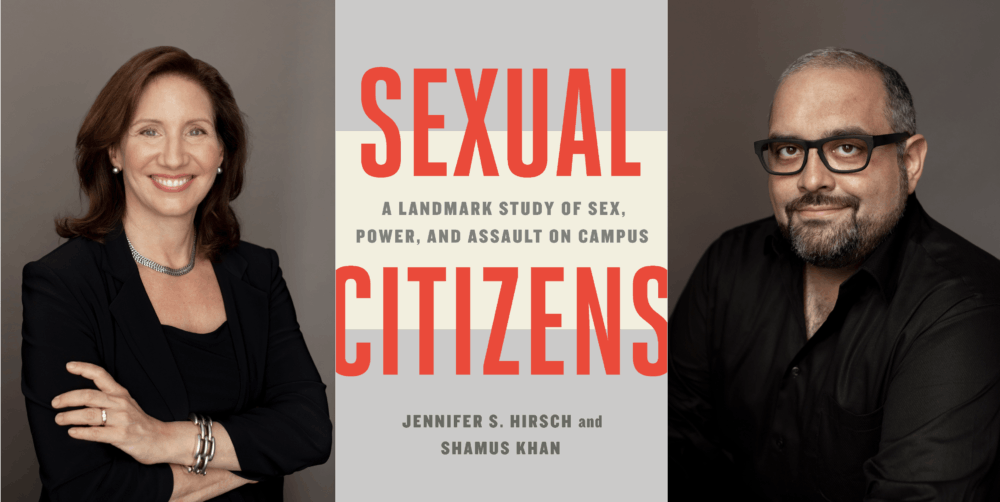“Every single Black woman who we interviewed had experienced unwanted touching...and had had an experience that signaled to them that their bodies were not deserving of respect, ”Jennifer Hirsch told her audience of University of New Mexico staff and students on Oct. 21 during a virtual book talk on “Sexual Citizens: A Landmark Study of Sex, Power, and Assualt on Campus.”
Elizabeth Dwyer Sandlin hosted the conversation where the discussion of race as one of several forms of power imbalance involved in sexual assault was just one of the many topics discussed.
Hirsch is a professor of sociomedical sciences at Columbia University, and Khan is a Professor of Sociology at Columbia as well. Alongside Claude Ann Mellins, a Professor of Medical Psychology, Hirsch co-directs the Sexual Health Initiative to Foster Transformation (SHIFT) research project with the goal of examining, “...the many factors that shape sexual health and sexual violence for undergrads at Columbia” according to the website on the study.
Hirsch and Khan, co wrote the book “Sexual Citizens” which details the ethnographic findings of SHIFT based on more than a year and a half of interviews with undergrad students at Columbia University and Barnard College.
It’s challenging to boil a 273 page book down into a less than two hour discussion but some of the main points that Hirsch and Khan hit on were how colleges and individual students can change how they approach sexual assault prevention.
“It’s not a campus problem, it’s an everyone problem,” said Hirsch.
Hirsch said that colleges cannot be a one-stop-shop for preventing sexual assault on campus.
However, she noted towards the end of the discussion that the “biggest leverage of power campuses have is allocation of space” and that since inequality is inherent in the current sexual geographies of campuses, “they can allocate space that undermines those power inequalities.”
Khan stated that the question campuses should be answering is not what orientation programs on consent to have for freshmen but instead, “how do we fundamentally redesign campus spaces and experiences, educate students in having clarity on sexual projects, and the importance of cultivating a sense of sexual citizenship?”
He added that another aspect of the “multi-sectoral approach” to sexual assault prevention involves creating “broad based coalitions between activist communities on campus. They all have a role to play because equality is a sexual assault prevention strategy.”
The larger conversation about sex education in K-12 schooling (or lackthereof) was an important topic of discussion.
“ (W)omen who had comprehensive sex education with training on to how to say ‘no’ were half as likely to be raped, which is about as effective as the flu vaccine” Hirsch explained.
Get content from The Daily Lobo delivered to your inbox
One of the comparisons made in the book is that sex education is analogous to driver’s education. When it’s done properly a young person should know how to drive, and how to respect the sexual citizenship of others as well as their own. But that’s not currently the case.
“Only teaching people about consent is like telling people how to drive by stopping at stop signs and red lights, but knowing that isn’t knowing how to drive” Hirsch stated on the current failings of sex education.
When asked about how the experiences of LGBTQ+ students interviewed during the study could change the gendered ‘script’ around consent and sexual encounters Khan stated that they provided a, “wonderful example of how consent and communication are important, but insufficient if not built on a foundation of equality.”
A broader focus of their work is on creating positive change that leads to “communities where everyone can thrive, even in instances where people have harmed others” he later explained.
Hirsch also pointed out that sexual assault is common and that “people who are doing it are members of the community who might not be intentionally seeking to harm their peers.”
She also made the distinction between “being a bad person and doing a bad thing.”
The strategy to move the public conversation away from adjudication and punishment and towards restorative justice is best summarized by Kahn’s justification for writing the book by saying that they, “wanted to write a book that the reader felt empathy and hope.”
Shelby Kleinhans is a freelance photographer and reporter at the Daily Lobo. She can be contacted at news@dailylobo.com or on Twitter @BirdsNotReal99






